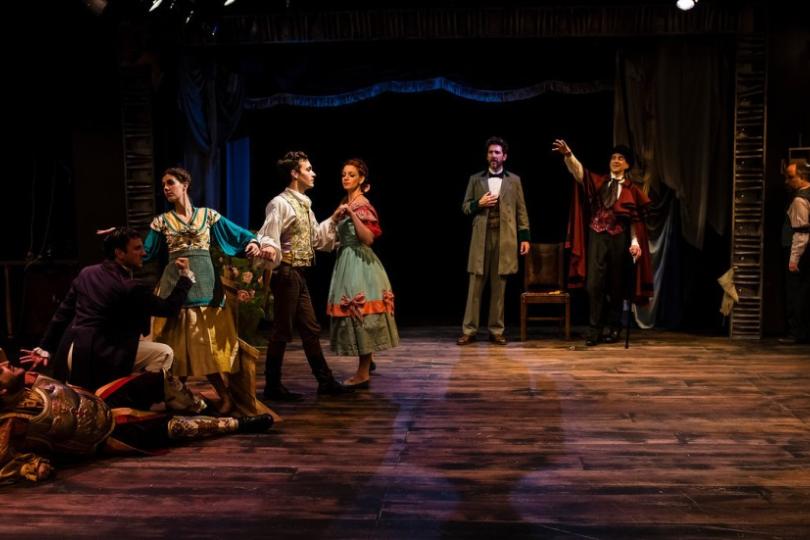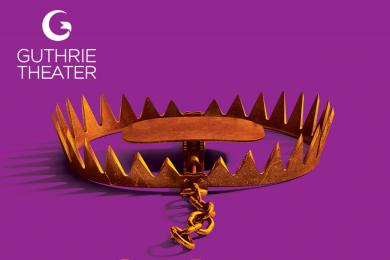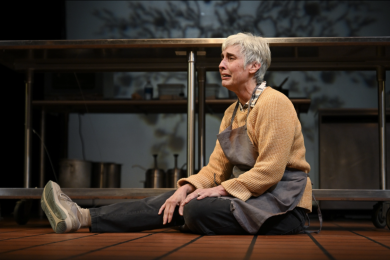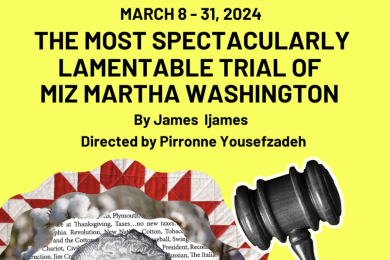Where illusion meets truth

According to The Illusion, Tony Kushner’s adaptation of Pierre Corneille’s L’Illusion comique, humanity is the victim of two great self-deceptions. In one, we pay to buy into someone else’s fantasy for a limited period of time; in the other, we create our own fantasies and vow to uphold them for a lifetime. These two lies, of course, are theater and love. Depressed yet?
The Illusion deals with some pretty dark stuff. In search of his estranged son, a father hires a magician to show him a series of scenes of his son’s life. These illusions may or may not be accurate, but the father chooses to believe them in order to mitigate his guilt at having been a crummy dad. And so he watches, powerless, as his son falls in love and slays his rival, only to be sentenced to death. His lover’s maid trades sexual favors for the key to his jail cell, but later, the boy gets caught cheating on his wife and is killed by his mistress’s husband.
But did I mention this is a comedy?
Despite its cynical undercurrents, The Illusion is really funny, as is L’Illusion comique. After all, putting on plays and falling in love may involve willing deception, but neither are they among life’s great vices (and both can be sources of great entertainment). Nevertheless, all of these meta-theatrical reflections on the power of illusion were unusual for the 17th century, and the play is all the more strange because it can’t seem to settle on a single genre for very long, moving quickly from light romantic farce to all-out tragedy and back again.
So when L’Illusion comique was first performed, Corneille had good reason to call it a “strange monster.” And with all of its oddities, it might not be a surprise that the play wasn’t frequently performed in the English-speaking world until Tony Kushner adapted it (loosely) into The Illusion in 1988. The Illusion heightens all of the play’s original eccentricities, with starker shifts in genre, broader physical comedy, and even more emphasis on mystery and artifice. Kushner also resists the temptation to dumb down the classics for a modern audience: like Corneille’s original, his script is rich, poetic, and colorful.
It takes a talented company to knit all of this together into a production that makes sense. But under Carin Bratlie’s direction, Theatre Pro Rata’s production does more than just make sense: it both entertains and edifies.
To begin with, Charles Hubbell plays the magician Alcandre like a seriously twisted Wizard of Oz. We might be taken in for a moment, but when he announces that he keeps his servant’s tongue in a jar and pierced his eardrums, we know exactly how far we can trust him. Despite our skepticism, Paul de Cordova, as Pridamant, displays a father’s perfect willingness to believe all he hears about his son; he strikes a perfect balance between a sympathetic figure and the kind of jerk who would hate his own son in the first place.
These nuanced performances extend to the rest of the ensemble as well, which is all the more impressive given that the characters are stereotypes straight out of commedia dell’ arte. Kelsey Cramer plays the crafty maid with admirable wit, while Michael Fell and Abby DeSanto shape the arc of the lovers’ relationship far more deeply than you’d expect to see from a 17th-century pastoral romance. Bryan Grosso totally won me over as Matamore, the blustering rival who writes sonnets and boasts of his strength in battle: at first, I feared his performance would be over-indulgent, but his ridiculous antics never stopped making me laugh.
The show’s design and direction are just as elegant as its polished performances. Mandi Johnson’s costumes are colorful and perfectly evocative of both time and character, and Sadie Ward’s simple, portable set pieces are thematically on pointe, while allowing the actors plenty of room to play. And play they do: the entire ensemble is physically animated, with blocking and fight choreography that are fast-paced and smoothly executed.
It is a slick achievement to be able to balance light-footed entertainment with poetic depths. The show’s easy laughs can provide a welcome distraction after a rough day at work. But if you want something to sink your intellectual teeth into, Kushner’s astute manipulation of the play’s hall-of-mirrors effect serves up plenty of juicy lines about illusion, memory, and love.
Early in the play, Pridamant describes the experience of watching his son’s exploits as “memory without pain. Like eating a great deal of delicious food without the concomitant indigestion.” I could say exactly the same thing about Theatre Pro Rata’s production: it is a balanced, flavorful meal that will leave you fully satisfied.




